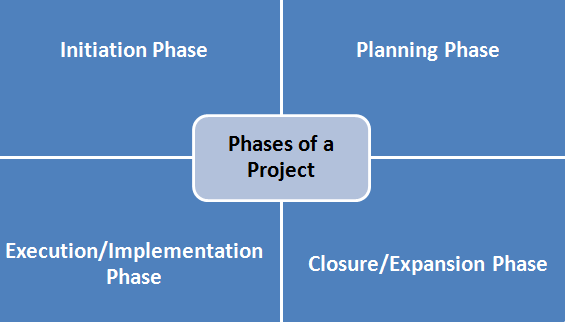Four Phases of a Project
Every human activity is a project, from starting a new business to cooking our daily meal, going to school, traveling and life in itself are projects.
What is a project?
In a very simple term, I will define a project as anything that has a starting point and an endpoint.
Virtually all activities (projects) carried out by a human being occur in phases?
Today, I will be sharing with The Total Entrepreneurs the four phases of a project. These four phases include the Initiation phase, planning phase, execution or implementation phase and finally the closure or expansion phase.

Four Phases of a Project
Phase 1: Initiation Phase
This is the starting stage of any project. At this stage, you define the goal of your project, research about the project; check its viability and prospective acceptability. It is at the initiation phase that you conduct a feasibility study, seek partners at this stage, contact stakeholders in the industry you are about to venture into.
Finally, you should create an initiation document that outlines the purpose of your project and what is required to start.
Phase 2: Planning Phase
The second stage of a project is the planning phase. This phase is key to a successful project. At this stage, you define the scope of the project, source of financing and draw a realistic timetable.
To be successful in this phase, you need to work S.M.A.R.T. Your work must be Specific, Measurable, Achievable, Realistic and Timely.
At this phase, it is pertinent that each individual involved with the project knows their roles and responsibilities. And be sure to involve experts for each project category.
Phase 3: Execution or Implementation Phase
It is at this phase of the project that you control resources generated and allocate resources to the team. Your project manager should direct and manage the project execution, if possible, set up a tracking system, have a project schedule.
Also, it is pertinent to always have meetings with your team. This is important in that, during these meetings, your team discusses the challenges they encounter and can advise on the best way to carry out a particular task based on On-The-Field (OTF) experience.
Phase 4: Closure or Expansion Phase
This is the time to ascertain whether the project was successful or not. Some projects have their stage of completion like construction, schooling, etc others if successful, require expansion like in business and investing. If a project (business or investment) yield good result, think of expansion and if not and you have tried the much you can, think of closing the project.
It is also at this fourth stage that you seek redirection. Ascertain why the project failed, who caused this failure (maybe a section of your team or you). Check for possible leakages and also involve project analysts to analyze your project and furnish you with the possible cause of the project failure.
Finally, it is pertinent that a report on the project is drafted with complete details of how the project was run.




